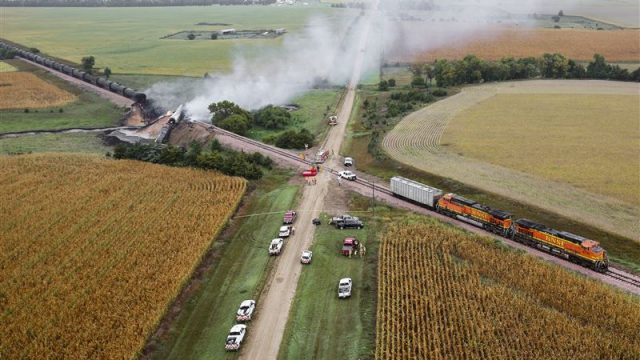Time To Institute Conditioning Regulations For Ethanol?

Recently left-wing environmental activists have been focusing on the safety of oil by rail shipments. And by focusing, I mean they’ve been trying to stoke fear among the public as a way of generating political opposition to transporting oil by rail.
The thinking of these activists, who also oppose pipelines, is that if they can manufacture a political bottleneck for shipping oil we’ll have to leave the oil in the ground. Yes, that’s exactly the intellectual level they’re operating at.
In pursuit of this goal, activists have taken to mapping the “blast zones” around railroad tracks, and claim that 25 million Americans live in them. “Oil train traffic has increased by more than 4,000 percent in the past five years, from 9,500 tank cars in 2008 to more than 400,000 in 2013, mostly Bakken crude from North Dakota and tar sands from Alberta, Canada,” a press release from the group, called Forest Ethics, states.
And in case you’re wondering if the goal here is really blocking oil shipments, consider this:
“These oil trains are an unacceptable threat, especially because we don’t even need this extreme oil,” Tom Paglia, the executive director of the group, is quoted as saying. “Oil use in the US and Canada is down, climate risks are up, and when you put these things together the only sane thing to do is ban these exploding trains.”
The problem is that lots of potentially hazardous materials are shipped by rail. It’s not just crude oil that can explode, though it’s been an unfortunate coincidence that crude oil has been involved in several incidents over the last few years. Ethanol can explode too, as happened near Scotland, South Dakota, over the weekend:
After derailment, an unknown amount of the ethanol leaked from the tankers onto a pasture and fire spread along an adjacent creek bed.
“There was a pretty good fireball coming out of one of the tanker cars,” Scotland Fire Chief Mike Mehrer said.
Don’t expect groups like Forest Ethics to add ethanol to their list of rail safety demands, though. Ethanol isn’t the same sort of political pinata that oil is. But yet, an ethanol train derailment is potentially every bit as dangerous as an oil train derailment.
The common denominator being the fact that these trains keep derailing, not that they’re carrying oil or ethanol or other hazardous materials.
Rail safety should be our concern. But instead, the environmental groups want to turn a rail safety issue into an excuse to stop transporting oil.




